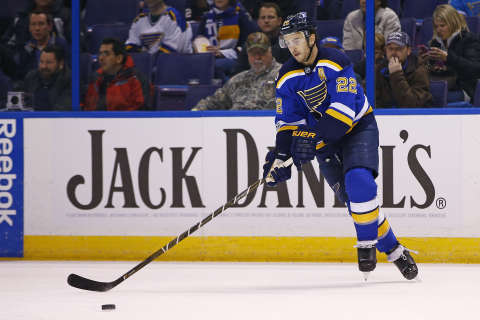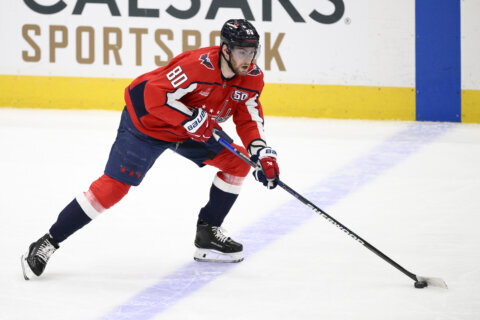WASHINGTON — When you have one of the very best players in the league taking the ice every night in your uniform, as the Washington Capitals do with Alex Ovechkin, expectations will always be high. When you win two Presidents Trophies during his tenure, as the Caps have done in 2009-10 and 2015-16, the anticipation for a title only heightens.
But at no point during Ovechkin’s time in Washington has the team been as committed to winning a title in the present year as, well, the present. The pressure is fully on the Caps to win this year with an expansion draft looming, a half dozen impending restricted free agents and an equal amount more unrestricted free agents heading into the summer.
T.J. Oshie and Justin Williams are two key cogs of this year’s team in the group of unrestricted free agents heading into next year. Meanwhile, the Caps already have better than $50 million committed toward the cap next season with only 11 players under contract. And backup goalie Philipp Grubauer has been widely speculated about as the potential first overall pick in the expansion draft by the Las Vegas Golden Knights. Seemingly, the only way for Washington to keep that from happening would be to trade the backup netminder first — either way, he’s likely gone.
General manager Brian MacLellan backed up his previous statements about the team’s immediate two-year window ending this season with his trade deadline actions, shipping off two picks — including this summer’s first-rounder — and promising youngster Zach Sanford for defenseman Kevin Shattenkirk. Based on the expiring contracts and other uncertainties the team will face this summer, there was no sense not to go all in trying to win this year.
While other teams, including Pittsburgh, were rumored to be looking at trading for Shattenkirk, MacLellan said at the deadline that the move wasn’t made with anyone but his own team in mind.
“The important thing for us is that he was a good fit for our team and what we were looking for,” MacLellan said last week. “None of (the discussions about other teams) came up within the negotiations. It was just strictly, does he fit with us and can we get it done?”
Nevertheless, MacLellan knows that his team’s biggest tests may come early, against those rivals, given the strength of the Metropolitan Division. Three of the league’s top four and four of the top six point-scoring teams are all jammed in the same division.
“It’s gonna be hard to get out of that group,” he said. “Those are the best teams that are going to play each other right away, and I think we’re as prepared for it as we possibly can be right now.”
If there’s a rational reason to think that Washington may be better prepared to break through this season, it might be the management of its superstar and the way that strategy has manifested in the team’s play. At 31, Ovechkin isn’t getting any younger, but he’s seen a notable drop in his ice time this season. After averaging 20:28 per game over the past four seasons, he’s skated a career low 18:18 this year. His scoring is down, but his assists are up, particularly those at even strength. He’s already dished out 21 even-strength helpers, the most since 2009 and 2010.
That trend portends a larger shift in the way the Caps score this season, one which potentially bodes well come playoff time. In the Ovechkin era, Washington has often had one of the strongest power play units in the league, but hasn’t seen that strength carry into playoff success. With looser penalty calls and the resulting fewer power plays in the postseason, a team that relies too much on scoring with the main advantage can find themselves weakened.
This year, the Caps are getting a better distribution of even-strength goals. After Monday night’s 4-2 loss to Dallas, the Caps are netting less than 20 percent of their goals (42-212) on the power play, the lowest such percentage of any 90+ point season under Ovechkin.

To put that another way, the Caps are scoring more at even strength than ever before. Washington has broken the 100-point plateau five times prior in the past decade, reaching 120 points twice, in 2009-2010 and 2015-2016. Their 354 wins since that 2009-2010 campaign rank third in the league only to the Chicago Blackhawks and Pittsburgh Penguins, who have four titles between them during that time. But in every one of those seasons, Washington has relied on the power play more than the eventual champion.
The late-February injury to Andre Burakovsy aside, the Caps have enjoyed generally good health most of the season. They’ve taken advantage of that, positioning themselves well for the shot to earn home ice with fewer than 20 games to go. They’ve transformed their offensive identity to a more playoff-sturdy approach, and they’ve added key pieces to shore up their weaknesses. And they’ve done all that while allowing the fewest goals in the league to date for the first time in the Ovechkin era.
Their general manager isn’t making any excuses or leaving any question unanswered for why this shouldn’t be the year. Only time will tell if installing that sense of urgency will finally lead to a title.






